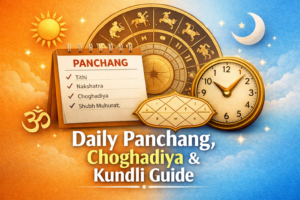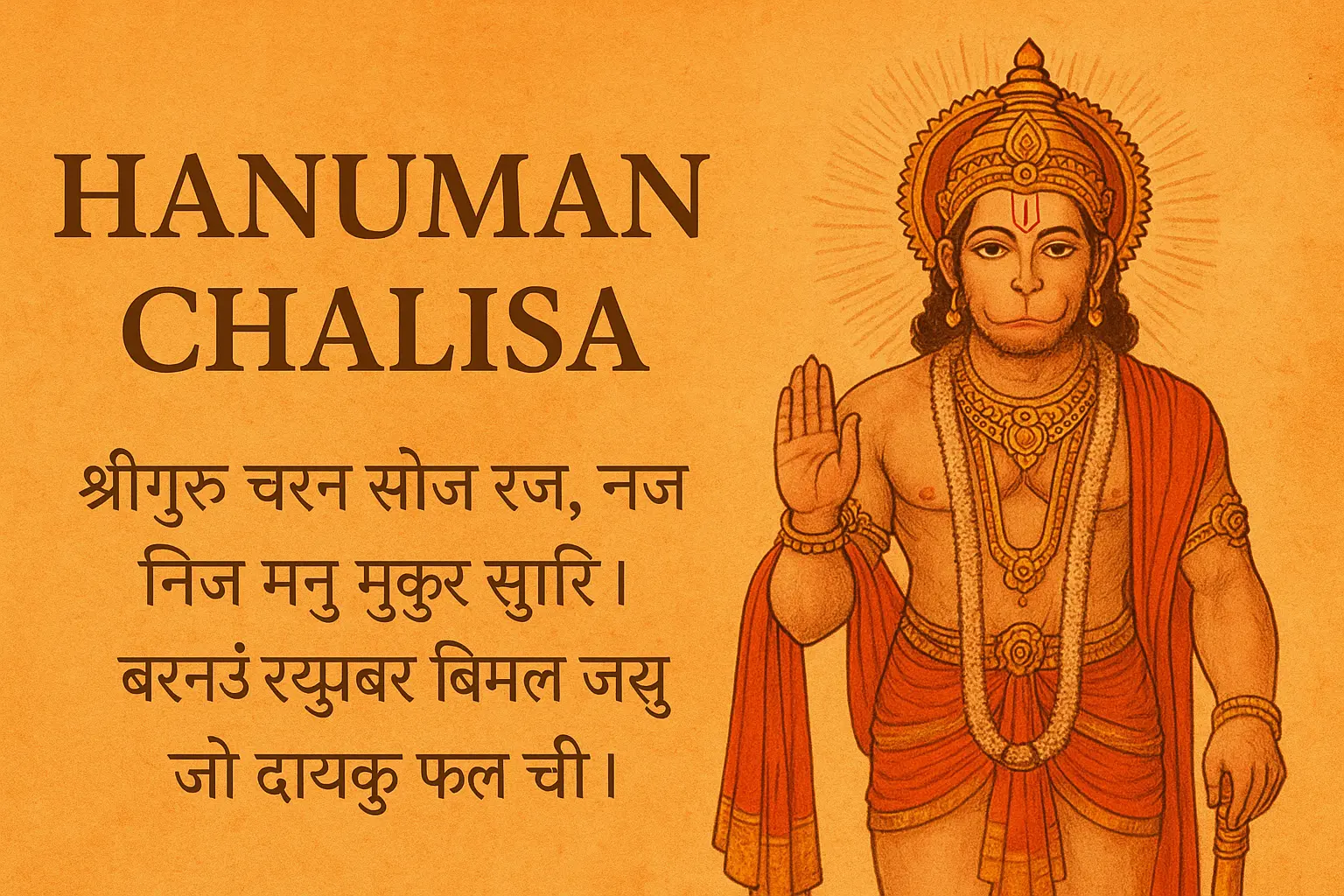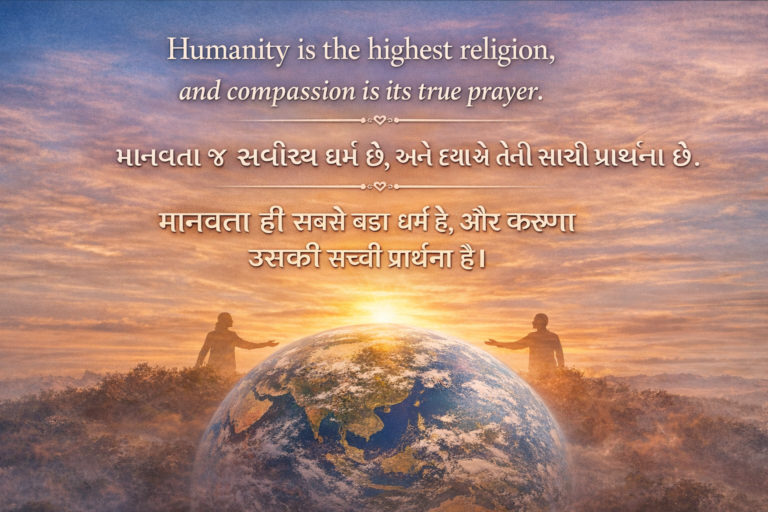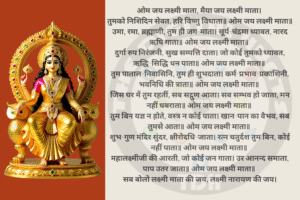Introduction
The Hanuman Chalisa is one of the most revered hymns in Hinduism, dedicated to Lord Hanuman, the symbol of strength, courage, and devotion. Composed by Saint Tulsidas, the Chalisa consists of 40 verses praising Hanuman’s wisdom, power, and service to Lord Rama.



Reciting the Hanuman Chalisa is believed to bring protection, remove obstacles, and instill courage. In this blog, we present the complete Hanuman Chalisa in Hindi and English transliteration, along with a detailed meaning of the verses to help devotees connect spiritually.
Origins of Hanuman Chalisa
Goswami Tulsidas, the great poet-saint of the 16th century, wrote the Hanuman Chalisa during a period of political and social unrest in India. Known for his devotion to Lord Rama, Tulsidas dedicated this hymn to Hanuman, who embodies courage, loyalty, and selfless service.
Legend says that Tulsidas composed the Chalisa while facing personal challenges, and through its recitation, he expressed deep devotion and sought Hanuman’s blessings. Over centuries, the Hanuman Chalisa has inspired millions of devotees, especially in times of difficulty.
Significance of Hanuman Chalisa
The Hanuman Chalisa is not merely a hymn; it is a spiritual tool. Its recitation helps overcome fear, builds mental resilience, and strengthens devotion. The Chalisa emphasizes faith, humility, and surrender, reminding devotees that divine intervention works best when accompanied by heartfelt devotion.
In the vast ocean of sacred Hindu hymns, the Hanuman Chalisa holds a special place in the hearts of millions. It is more than just a poem; it is a powerful invocation of Lord Hanuman, the embodiment of unwavering devotion, immense strength, and selfless service. For centuries, its forty verses have provided solace, courage, and spiritual upliftment to devotees. Let’s delve into the story and profound significance of this timeless prayer.
The Miraculous Origin of the Chalisa
The creation of the Hanuman Chalisa is a story of faith triumphing over adversity. It was composed in the 16th century by the great poet-saint Goswami Tulsidas, the author of the epic ‘Ramcharitmanas’.
The legend says that when Tulsidas proclaimed that one could meet Lord Rama through true devotion, the Mughal Emperor Akbar summoned him to his court. The emperor, skeptical of his claims, challenged Tulsidas to show him Lord Rama. When Tulsidas explained that one could only see the Lord with pure devotion, not on command, the angered emperor imprisoned him.
It was in the confines of the prison that Tulsidas, with unshakable faith, composed the forty verses praising Lord Hanuman. As he chanted the Chalisa for forty days, a miraculous event unfolded. A massive army of monkeys descended upon the emperor’s city of Fatehpur Sikri, causing chaos and panic. Advised that this was the work of the devotee he had imprisoned, Akbar realized his mistake, released Tulsidas with great respect, and asked for his forgiveness. This incident cemented the belief in the immense power contained within the Hanuman Chalisa.
The Power and Significance of Chanting
The word ‘Chalisa’ is derived from ‘chalis’, meaning forty, as the hymn has forty principal verses. Chanting the Hanuman Chalisa is believed to invoke Hanuman’s divine protection. Devotees recite it to overcome obstacles, conquer fears, and gain strength and confidence.
Its benefits are said to be manifold:
- Instills Courage: The Chalisa fills the chanter’s heart with courage, helping to overcome fear and anxiety.
- Wards off Negativity: Its vibrations are believed to create a protective shield against negative energies and evil spirits.
- Overcomes Obstacles: Reciting it with faith helps in removing difficulties from one’s path.
- Spiritual Growth: It deepens one’s devotion and brings one closer to the divine.
Key Verses and Their Meaning
While every verse is potent, a few stand out for their profound message.
Hanuman Chalisa Verses
दोहा / Couplet
श्रीगुरु चरन सरोज रज, निज मनु मुकुरु सुधारि ।
बरनउँ रघुबर बिमल जसु, जो दायकु फल चारि ॥
Shree Guru charan saroj raj, nij mana mukuru sudhaari.
Barnaun Raghuvar bimal jasu, jo daayaku phal chaari.
Meaning: Polishing the mirror of my heart with the dust of my Guru’s lotus feet, I recite the divine glory of Lord Ram, which grants the fruits of all four aims of life.
बुद्धिहीन तनु जानिके, सुमिरौं पवन कुमार
बल बुधि विद्या देहु मोहि, हरहु कलेश विकार
Buddhiheen tanu janike, sumiraun pawan-kumar.
Bal buddhi vidya dehu mohi, harahu kalesh vikaar.
Meaning: Realizing my mind is weak, I remember the Son of the Wind and pray for strength, wisdom, knowledge, and relief from suffering and faults.
चौपाई / Quatrain
जय हनुमान ज्ञान गुन सागर, जय कपीस तिहुँ लोक उजागर॥१॥
राम दूत अतुलित बल धामा, अंजनि पुत्र पवनसुत नामा॥२॥
Jai Hanuman gyan gunn sagar, jai kapish tihun lok ujaagar (1).
Ramdoot atulit bal dhama, Anjani-putra pawansut naama (2).
Meaning: Victory to Hanuman, the ocean of wisdom and virtue, the supreme leader of monkeys and illuminator of the three worlds. He is Lord Ram’s messenger, the abode of unmatched strength, and the son of Anjani and the Wind-god.
महावीर बिक्रम बजरंगी, कुमति निवार सुमति के संगी॥३॥
कंचन बरन बिराज सुबेसा, कानन कुंडल कुँचित केसा॥४॥
Mahaveer vikram bajrangi, kumati nivaar sumati ke sangi (3).
Kanchan baran biraj subsea, kaanan kundal kunchit kesa (4).
Meaning: You are courageous and mighty, destroyer of evil thoughts, supporter of the virtuous. Golden-skinned, adorned with fine clothes, curly hair, and earrings.
हाथ बज्र अरु ध्वजा बिराजे, काँधे मूँज जनेऊ साजे॥५॥
शंकर सुवन केसरी नंदन, तेज प्रताप महा जगवंदन॥६॥
Haath vajra aur dhwaja biraaje, kaandhe moonj janeu saaje (5).
Shankar suvan kesarinandan, tej prataap maha jag bandan (6).
Meaning: Wielding a mace and flag, wearing the sacred thread. Son of Lord Shiva and Kesari, with unmatched glory worshiped by the world.
विद्यावान गुनी अति चातुर, राम काज करिबे को आतुर॥७॥
प्रभु चरित्र सुनिबे को रसिया, राम लखन सीता मनबसिया॥८॥
Vidyavaan guni ati chaatur, Ram kaaj karibe ko aatur (7).
Prabhu charitra sunibe ko Rasiya, Ram Lakhan Sita mana basiya (8).
Meaning: Wise, virtuous, and eager to serve Lord Ram. Delighting in listening to the Lord’s deeds, with Ram, Lakshman, and Sita dwelling in your heart.
सूक्ष्म रूप धरि सियहि दिखावा, विकट रूप धरि लंक जरावा॥९॥
भीम रूप धरि असुर सँहारे, रामचंद्र के काज सवाँरे॥१०॥
Sukshma roop dhari siyanhi dikhawa, vikat roop dhari Lanka jarawa (9).
Bheem roop dhari asura sanghare, Ramchandra ke kaaj sanware (10).
Meaning: Appearing small before Sita, mighty in Lanka. Destroyed demons with massive strength and accomplished Lord Ram’s tasks.
लाय सजीवन लखन जियाए, श्री रघुबीर हरषि उर लाए॥११॥
रघुपति कीन्ही बहुत बड़ाई, तुम मम प्रिय भरत-हि सम भाई॥१२॥
Laaye sanjeevan lakhana jiyaaye, Shree Raghuveer harashi urr laaye (11).
Raghupati keenhi bahut badai, tum mum priya, Bhartahi sum bhai (12).
Meaning: Revived Lakshman with Sanjivani herb. Lord Ram praised and embraced you as His dear brother, equal to Bharat.
सहस बदन तुम्हरो जस गावै, अस कहि श्रीपति कंठ लगावै॥१३॥
Sahas badan tumharo jas gave, asa kahi Shreepati kanth lagaave (13).
Meaning: Lord Ram embraced Hanuman and praised him, as he expressed gratitude for his immense devotion.
सनकादिक ब्रह्मादि मुनीसा, नारद सारद सहित अहीसा॥१४॥
Sankadik brahmadi munisa, Narad sarad sahit aheesa (14).
Meaning: Saints like Sanaka, sages like Brahma, Narad, and the goddess Saraswati all sing your glory.
जम कुबेर दिगपाल जहाँ ते, कवि कोविद कहि सके कहाँ ते॥१५॥
Jam Kuber digpal jahan te, kavi kovid kahi sake kahan te (15).
Meaning: Even the gods like Yama, Kuber, and the guardians of directions, along with scholars and poets, cannot fully describe your greatness.
तुम उपकार सुग्रीवहि कीन्हा, राम मिलाय राज पद दीन्हा॥१६॥
Tum upkaar Sugreev hi keenha, Ram milaaye raj-pad deenha (16).
Meaning: You helped Sugreev by introducing him to Lord Ram, thereby restoring his kingship.
तुम्हरो मंत्र बिभीषण माना, लंकेश्वर भये सब जग जाना॥१७॥
Tumharo mantra Vibhishan maana, Lankeshwar bhaye sab jag jaana (17).
Meaning: Vibhishan obeyed your advice, became king of Lanka, and the whole world recognized him.
युग सहस्त्र जोजन पर भानू, लिल्यो ताहि मधुर फ़ल जानू॥१८॥
Yug sahastra jojan par Bhanu, leelyo taahi madhur phal jaanu (18).
Meaning: Mistaking the sun for a sweet fruit, you leapt thousands of miles to swallow it.
प्रभु मुद्रिका मेलि मुख माही, जलधि लाँघि गए अचरज नाही॥१९॥
Prabhu mudrika meli mukh maahi, jaladhi laandhi gaye achraj naahi (19).
Meaning: Carrying Lord Ram’s ring in your mouth, you crossed the ocean—no one was surprised at this heroic feat.
दुर्गम काज जगत के जेते, सुगम अनुग्रह तुम्हरे तेते॥२०॥
Durgam kaaj jagat ke jete, sugam anugrah tumhare tete (20).
Meaning: All difficult tasks in the world become easy with your grace.
राम दुआरे तुम रखवारे, होत ना आज्ञा बिनु पैसारे॥२१॥
Ram duaare tum rakhvare, hota na aagya binu paisare (21).
Meaning: You are the guardian of Lord Ram’s doors; no one can pass without your permission.
सब सुख लहैं तुम्हारी सरना, तुम रक्षक काहु को डरना॥२२॥
Sab sukh lahe tumhari sarna, tum rakshak kahu ko dar na (22).
Meaning: Those who seek your refuge enjoy all happiness and need not fear anything.
आपन तेज सम्हारो आपै, तीनों लोक हाँक तै कापै॥२३॥
Aapan tej samharo aape, teeno lok haank te kaampe (23).
Meaning: You alone can control your immense power, and the three worlds tremble at your roar.
भूत पिशाच निकट नहि आवै, महावीर जब नाम सुनावै॥२४॥
Bhoot pishaach nikat nahi aave, Mahaveer jab naam sunaave (24).
Meaning: Evil spirits and ghosts do not approach those who chant the name of mighty Hanuman.
नासै रोग हरे सब पीरा, जपत निरंतर हनुमत वीरा॥२५॥
Naase rog hare sab peera, japat nirantar hanumat veera (25).
Meaning: Chanting Hanuman’s name removes all diseases and pain. Regular recitation is highly auspicious.
संकट तै हनुमान छुडावै, मन क्रम वचन ध्यान जो लावै॥२६॥
Sankat te hanuman chudave, mann kram vachan dhyaan jo laave (26).
Meaning: Whoever meditates on Hanuman with thought, word, and deed is freed from all troubles.
सब पर राम तपस्वी राजा, तिनके काज सकल तुम साजा॥२७॥
Sab par Ram tapasvi raja, tin ke kaaj sakal tum saaja (27).
Meaning: Lord Ram is the greatest ascetic among kings, yet you perform all His tasks.
और मनोरथ जो कोई लावै, सोई अमित जीवन फल पावै॥२८॥
Aur manorath jo koi laave, soi amit jivan phal paave (28).
Meaning: Whoever comes to you with a sincere wish receives abundant and lasting rewards.
चारों जुग परताप तुम्हारा, है परसिद्ध जगत उजियारा॥२९॥
Chaaron yug partap tumhara, hai parsidh jagat ujiyara (29).
Meaning: Your glory spans all ages and is renowned throughout the world.
साधु संत के तुम रखवारे, असुर निकंदन राम दुलारे॥३०॥
Saadhu-sant ke tum rakhvare, asur nikandan ram dulaare (30).
Meaning: You protect saints, destroy demons, and are beloved by Lord Ram.
अष्ट सिद्धि नौ निधि के दाता, अस वर दीन जानकी माता॥३१॥
Ashta siddhi nau nidhi ke data, as var deen janaki mata (31).
Meaning: Blessed by Mother Sita, you grant the eight supernatural powers (Siddhi) and nine treasures (Nidhi) to the deserving.
राम रसायन तुम्हरे पासा, सदा रहो रघुपति के दासा॥३२॥
Ram rasayan tumhare paasa, sada raho Raghupati ke daasa (32).
Meaning: You carry the essence of devotion to Lord Ram and remain His humble servant forever.
तुम्हरे भजन राम को पावै, जनम जनम के दुख बिसरावै॥३३॥
Tumhare bhajan ram ko paave, janam janam ke dukh bisraave (33).
Meaning: Singing your praises and chanting your name brings relief from the sorrows of countless lifetimes.
अंतकाल रघुवरपुर जाई, जहाँ जन्म हरिभक्त कहाई॥३४॥
Antkaal Raghuvar pur jaayi, jahan janam Hari-bhakt kahayi (34).
Meaning: By your grace, one attains Lord Ram’s abode after death and is remembered as His devotee.
और देवता चित्त ना धरई, हनुमत सेई सर्व सुख करई॥३५॥
Aur devta chitta na dharai, Hanumat sei sarva sukh karai (35).
Meaning: There is no need to worship other deities; service to Hanuman grants all happiness.
संकट कटै मिटै सब पीरा, जो सुमिरै हनुमत बलबीरा॥३६॥
Sankat kate, mite sab peera, jo sumire Hanumat balbeera (36).
Meaning: Remembering Hanuman removes all troubles and pain.
जै जै जै हनुमान गुसाईँ, कृपा करहु गुरु देव की नाई॥३७॥
Jai jai jai Hanuman gosain, kripa karahu Gurudev ki naai (37).
Meaning: Glory to Hanuman! May he bless us as our supreme Guru.
जो सत बार पाठ कर कोई, छूटहि बंदि महा सुख होई॥३८॥
Jo sat baar paath kar koi, chutahi bandhi maha sukh hoyi (38).
Meaning: Reciting the Chalisa 100 times frees one from all bondage and brings great bliss.
जो यह पढ़े हनुमान चालीसा, होय सिद्ध साखी गौरीसा॥३९॥
Jo yeh padhe Hanuman Chalisa, hoye siddhi saakhi gaurisa (39).
Meaning: Reciting the Hanuman Chalisa fulfills all wishes, with Lord Shiva as the witness.
तुलसीदास सदा हरि चेरा, कीजै नाथ हृदय मह डेरा॥४०॥
Tulsidas sada Hari chera, keeje nath hriday mah dera (40).
Meaning: Says Tulsidas: May I remain a servant of Lord Ram, and may Hanuman always reside in my heart.
Final Doha / Couplet
पवन तनय संकट हरन, मंगल मूरति रूप।
राम लखन सीता सहित, हृदय बसहु सुर भूप॥
Pawan tanay sankat haran, mangal murti roop.
Ram Lakhan Sita sahit, hriday basahu sur bhoop.
Meaning: O Son of Wind, destroyer of sorrows, embodiment of fortune. May you always dwell in my heart along with Ram, Lakshman, and Sita.
Jaikar / Victory Chant
सियावर रामचंद्र की जय! पवनसुत हनुमान की जय! बोलो भई सब संतन की जय!
Siyawar Ramchandra ki Jai! Pawansut Hanuman ki Jai! Bolo bhai, sab Santan ki Jai!
Meaning: Glory to Lord Ram and Hanuman! Victory to all saints and devotees!

















 The Digital Hunts – Global Guest Post Site
The Digital Hunts – Global Guest Post Site Contact Us:
Contact Us: